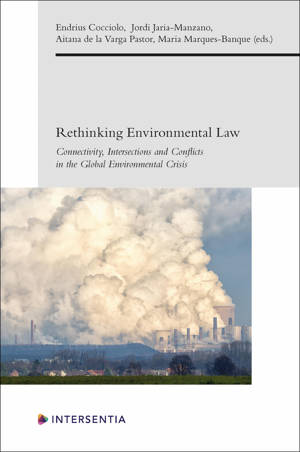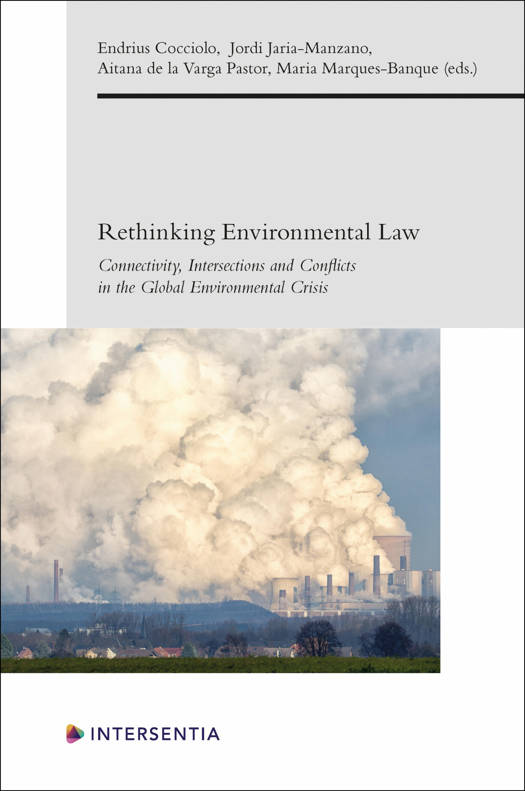
Onze Vivlio e-readers ondervinden momenteel synchronisatieproblemen. We doen er alles aan om dit zo snel mogelijk op te lossen. Onze excuses voor het ongemak!
- Afhalen na 1 uur in een winkel met voorraad
- Gratis thuislevering in België vanaf € 30
- Ruim aanbod met 7 miljoen producten
Onze Vivlio e-readers ondervinden momenteel synchronisatieproblemen. We doen er alles aan om dit zo snel mogelijk op te lossen. Onze excuses voor het ongemak!
- Afhalen na 1 uur in een winkel met voorraad
- Gratis thuislevering in België vanaf € 30
- Ruim aanbod met 7 miljoen producten
Zoeken
Rethinking Environmental Law
Connectivity, Intersections and Conflicts in the Global Environmental Crisis
€ 138,45
+ 276 punten
Omschrijving
The book offers a profound exploration of the evolving field of environmental law in the context of our rapidly expanding human footprint on the planet. Initially focused on local environmental concerns, environmental law has evolved to grapple with the intricate and expansive implications of human activity on the earth system, particularly in light of the urgent climate emergency in the Anthropocene era. The text underscores the interconnectedness of various physical processes on a planetary scale, producing a complex web of interactions that challenge traditional perceptions of environmental dynamics. This complexity presents formidable challenges to the field of environmental studies, demanding interdisciplinary collaboration and a departure from traditional legal paradigms rooted in sectoral and jurisdictional boundaries. Furthermore, the book emphasises the role of complexity in fostering connectivity between legal orders and sectors and other disciplines, as well as giving rise to conflicts within environmental law. It highlights the need for legal scholars and practitioners to transcend specialised knowledge silos, embrace interdisciplinary exchanges, and acknowledge the significance of conflict as a source of legal innovation. The volume draws upon insights and selected contributions presented at the 9th European Environmental Law Forum, held in 2022 in Tarragona, Spain. These contributions have been meticulously elaborated into chapters that capture the depth and breadth of the debates held during the conference. Readers will gain valuable insights into the multifaceted challenges posed by the earth system's complexity to contemporary environmental law. The book is divided into two main parts. The first explores the themes of "connections", addressing critical intersections between climate change, biodiversity loss, air pollution, energy systems, circular economy, and more. It delves into the need for legal frameworks to adapt to and address these intricate connections, providing practical insights and recommendations. The second part of the book delves into the realm of "conflicts and frictions", shedding light on the challenges arising from the complex and multifaceted nature of environmental issues. It delves into topics such as technological innovation, legal constraints, environmental damage compensation, and climate litigation, offering a nuanced understanding of these critical areas. Ultimately, this book serves as a comprehensive resource for scholars, practitioners, and anyone interested in the transformative role of environmental law when addressing the global environmental crisis and navigating the transition to a new geological era. As society grapples with the complexities of the Anthropocene, rethinking environmental law becomes imperative, and this volume provides valuable insights into that vital process. With contributions by Eva Balounová (Institute of State and Law of the Czech Academy of Sciences), Camille Bertaux (Université Saint-Louis Bruxelles), An Cliquet (Ghent University), Endrius Cocciolo (Universitat Rovira I Virgili; CEDAT), Aitana De la Varga Pastor (Universitat Rovira I Virgili; CEDAT), Martijn van Gils (Utrecht University), Tilak Ginige (Bournemouth University), Carola Glinski (University of Copeghagen), Jordi Jaria-Manzano (Universitat Rovira I Virgili; CEDAT), Matija Kajic (Utrecht University), Francesca Leucci (Wageningen University), Maria Marques-Banque (Universitat Rovira I Virgili; CEDAT), Sophie Melchers (Utrecht University), Alba Nogueira Ló pez (Universidade de Santiago de Compostela), Lissia Queiroz de Menezes (Bournemouth University), Leonie Reins (Erasmus University Rotterdam), Albert Ruda-Gonzalez (University of Girona), Gonzalo Vial Fourcade (University of Cambridge), Jiri Vodicka (Masaryk University), and Ida Mae de Waal (Utrecht University).
Specificaties
Betrokkenen
- Uitgeverij:
Inhoud
- Aantal bladzijden:
- 400
- Taal:
- Engels
- Reeks:
Eigenschappen
- Productcode (EAN):
- 9781839704475
- Verschijningsdatum:
- 14/06/2024
- Uitvoering:
- Hardcover
- Formaat:
- Genaaid
- Afmetingen:
- 171 mm x 241 mm
- Gewicht:
- 600 g

Alleen bij Standaard Boekhandel
+ 276 punten op je klantenkaart van Standaard Boekhandel
Beoordelingen
We publiceren alleen reviews die voldoen aan de voorwaarden voor reviews. Bekijk onze voorwaarden voor reviews.










